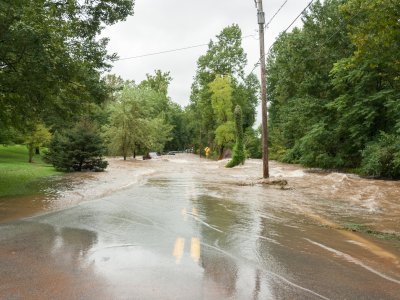As global temperatures rise, the implications of climate change are unfolding quickly. Political, cultural, economic, social, and psychological factors influence societal views about climate change adaptation. Although ignoring the implications of a changing climate can seem easier in the short run, avoidance will be costly in the long run. Ignoring the issue is especially problematic in areas with forecasts for more extensive and frequent floods.
We study which flooding-related issues people view as most salient within flood-prone river communities in Pennsylvania, one of the most flood-prone states in the U.S. As we interviewed people about household flood-protection issues this summer, we noticed that people often do not consider climate change implications when thinking about flooding. Instead, many avoid the topic outright. When planning for future flooding, people tend to look back on past flooding experiences. For instance, a homeowner prepares for floodwaters to reach similar heights to past floods.

Changing future conditions mean that past benchmarks are no longer a reliable point of departure. In many areas of the Northeast, scientists forecast rising temperatures and more frequent extreme rainfall events. Further, new urban development often means water runs off into rivers and streams more quickly, and aging infrastructure may not hold up to future flooding. Failing to acknowledge the implications of these changes can leave communities underprepared.
Our interviews revealed many barriers to flood resiliency. First, local officials expressed difficulties in engaging communities about flooding impacts. Second, people find flooding issues ignorable because of the “sunny day” problem. Preparing for disasters that only occur about once every decade is challenging. People tend to think about floods as a threat emerges. Lastly, government standards and building codes are based upon historical records rather than projected future conditions.
Flood resiliency requires awareness but not necessarily unreasonable financial burdens. Preparing for more severe flooding can have benefits beyond flood protection. Properties that have flooded repeatedly may be eligible for voluntary buyout programs. A buyout occurs when the government purchases a property at market value and converts it to a lower-risk use but valuable amenity such as a park. Elevating a home above the currently recommended standards, which do not account for larger floods, may allow property owners to convert the space underneath their home into an outdoor entertainment area. Financial incentives are often available to help fund flood-protection projects. Successful projects can increase property values and decrease flood insurance rates.
Many towns are working hard to implement flood-resilient strategies. When under-prepared for flooding, cleanup is more costly and takes longer. Preparing for floods makes cleanup less burdensome and allows towns to realize the co-benefits of adaptation, such as the addition of community parks and greenspace.
Realizing the potential benefits of flood-resilient initiatives can start with research and conversations with city or county officials. The State of Pennsylvania has many resources available to help people understand flooding impacts. We assembled two simple factsheets to help share some of the lessons we have learned from our study. The first introduces sources of widely available household flood-risk information and offers recommendations about how to use them. The second provides a guide for navigating home protection decisions. Negotiating these decisions can be difficult. However, reaching out to your local officials is an excellent way to explore what opportunities may be available for your unique situation. Learn more about our team’s research by visiting the Penn State Initiative for Resilient Communities webpage.






